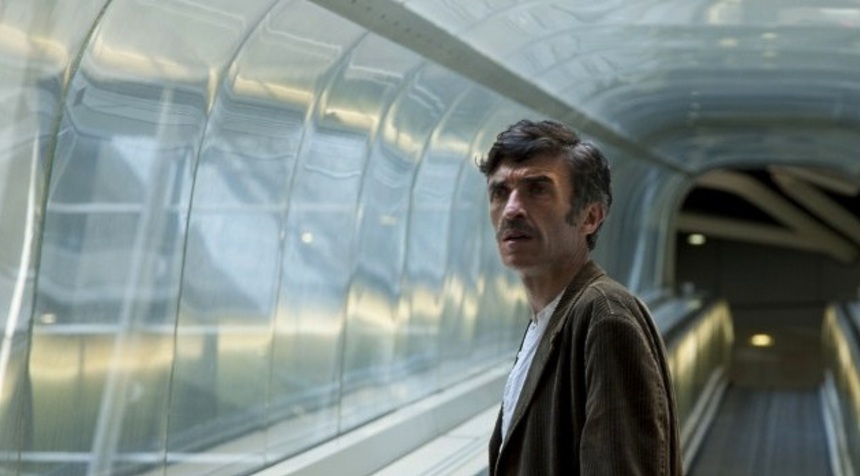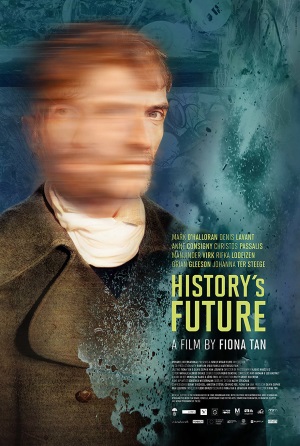Rotterdam 2016 Review: HISTORY'S FUTURE, A Shower Of Innumerable Atoms

Backed by the Netherlands Film Fond and the Irish Film Board, this Australian auteur's latest movie proves to be a fragmented piece about a man with severe memory loss who goes in search of something to anchor his new existence. Or at least that's what I think he does, because really we are only ever see this hero's journey in a series of often unconnected snippets, as he wildly roves across multiple countries and continents, almost always confusedly spouting off like an even more deranged imitation of Peter Capaldi playing Doctor Who. Rather beautifully, too, this tragic figure proves so rootless it is almost as if he becomes a social chameleon, fluidly able to flow in and out of the lives of those around him,
In terms of the feeling it gives, though, History's Future could perhaps be best described as being like waking up on the crest of a giant collapsing soufflé. That's because the film's typically unrelated, brain-damaged scenes seem to come directly out of a sort of fine art tradition where the emphasis is very much on trying to discover the techniques to allow you to express the new kinds of experiences (in this case that of extreme amnesia) you want to express in your chosen medium.
Well, that is something Tan certainly achieves with great initial flair, because it soon becomes apparent that she seems to be creating some kind of potent anti-film. After all, what better way is there to start an anti-film than with "The End"? And that's exactly what she does: just as you're beginning to settle down and get comfy in your plush cinema chairs, History's Future begins playing its credits, giving you an incredible feeling that something might just have gone horribly wrong in the projection room.
Only that's not the case, and the director's wonderfully dark, subversive humour certainly isn't about to end there either. The opening shot then falls on a man sleeping in an empty cinema, plopping you firmly back on the crust of that dreamy soufflé. In fact, it actually all feels a bit like one of those medieval tales where you're told the protagonist has sleepily face-planted on a book and begun to dream the very narrative we're reading. Moments later, the film then begins playing backwards as we witness the dregs of the audience filtering back into the auditorium in reverse.
This literal act of rewinding kind of conjures to mind that Ionesco play, where the actors start bringing chairs out on stage and unsettling start setting them out as if to mirror you. Only it isn't long before we're then hit with a montage of footage from natural disasters to acts of conflict amidst the Occupy Movement or the Arab Spring, creating this sort of log of recent contemporary history. The original narrative that follows doesn't abate this style either, as it flows in a similarly mish-mash manner until it almost feels as though you've lost total control of the autoplay function on Youtube. And that's largely because everything feels so utterly out of joint - though at the same time, it is undeniably absorbing.
It has a point too: the protagonist's mind, through which this film is filtered, really has experienced some kind of terribly violent trauma, and Tan does seem to have committed herself fully to exploring how somebody might perceive the world in that deranged state. Plus she really captures the sort of inverted logic that neurological conditions can sometimes manifest, like the fact that her mysterious protagonist can speak French, German and English (something lead actor Mark O'Halloran does admirably) but can't even remember his own name.
 Indeed, we're never fully introduced to a definite first name for the film's enigmatic "missing person," another good example of how Tan seems to be creating some kind of anti-film (or film in reverse). And depending on what your cinematic taste-buds are like, this film will either go down like a cinematic nightmare or (almost literally) a dream committed to film. Nevertheless, you can certainly say that there are times when the film's semantic acid trips are incredibly compelling; it's only when the visual leaps don't quite resonate with you that they cut through your suspension of disbelief like a slap in the face.
Indeed, we're never fully introduced to a definite first name for the film's enigmatic "missing person," another good example of how Tan seems to be creating some kind of anti-film (or film in reverse). And depending on what your cinematic taste-buds are like, this film will either go down like a cinematic nightmare or (almost literally) a dream committed to film. Nevertheless, you can certainly say that there are times when the film's semantic acid trips are incredibly compelling; it's only when the visual leaps don't quite resonate with you that they cut through your suspension of disbelief like a slap in the face.Either way, this is definitely one piece that requires you to bring your concentrated A-game, and that's often particularly true because it seems to bear so many allusions. The film, for example, often overtly references Surrealism with lots of interjected close-ups on Surrealist paintings, and Tan seems very determined to feed you their sense of intense but cryptic significance. But at the same time, with his Irish accent and his dishevelled appearance, O'Halloran does bear a carry on his shoulders a clear common resemblance to both Samuel Beckett (who you can definitely hear in the script) and Vincent Van Gogh (whose shower of impressionistic strokes can sometimes be felt).
Similarly, the character's restless movement between languages, locales and lifestyles as he tries to run away from a past he can't remember also feels inescapably like some kind of hyper Beat experience - like the kind of thing Jack Kerouac would be producing by now if he was still alive and still on bennies. But the film's ceaseless shuffling between styles and almost hyperlinked references could just as easily be compare to the kind of experience T.S. Eliot created in his patch-work masterpiece The Wasteland.
This last text seems to have clearly influenced Tan's approach, as she alludes directly to it with her references to the all-suffering Tiresias and her creation of these sorts of clairvoyant Sibyl characters who can see much more than they can convey. Though as will all the movements she references, Tan's attempt to convey the difficulties at arriving at certain and sane meaning aren't the same thing as eschewing meaning altogether, and in the end one deep question does clearly emerge: what would we all become if we had no history to reference - and what's more, what would we inadvertently choose to change for better or worse?
As such, History's Future actually becomes a pretty great depiction of a serious mental condition, because time and time again the director shows that her character's madness isn't that different from our sanity. And the fear he feels isn't that different to what we all feel as we cling to this giant rock hurtling through space, either. So for that reason, this feature would make a savvy and interesting addition to any mental health programmes might be planning out there, but at the same time it will also appeal to people who just enjoy seeing film deployed in innovative and creative ways.
Though that said, for all the evident abundance of creative ideas that Tan clearly has, it is perhaps a bit challenging to see them all played out like this at feature length. Equally, Tan's tendency to shoot obliquely, from a sort of distanced, non-confrontational sideways angle, does make it at times frustratingly difficult to snuggle up to the protagonist as much as you might normally like to. Again though, the director's ability to draw out the surreal aspects of the banal using a largely denotational medium and style certainly is fascinating - it just really is an experience you've got to be sure you want to commit to before you strap yourself in.
History's Future
Director(s)
- Fiona Tan
Writer(s)
- Fiona Tan
- Jonathan Romney
Cast
- Mark O'Halloran
- Denis Lavant
- Anne Consigny
- Hristos Passalis

Do you feel this content is inappropriate or infringes upon your rights? Click here to report it, or see our DMCA policy.






